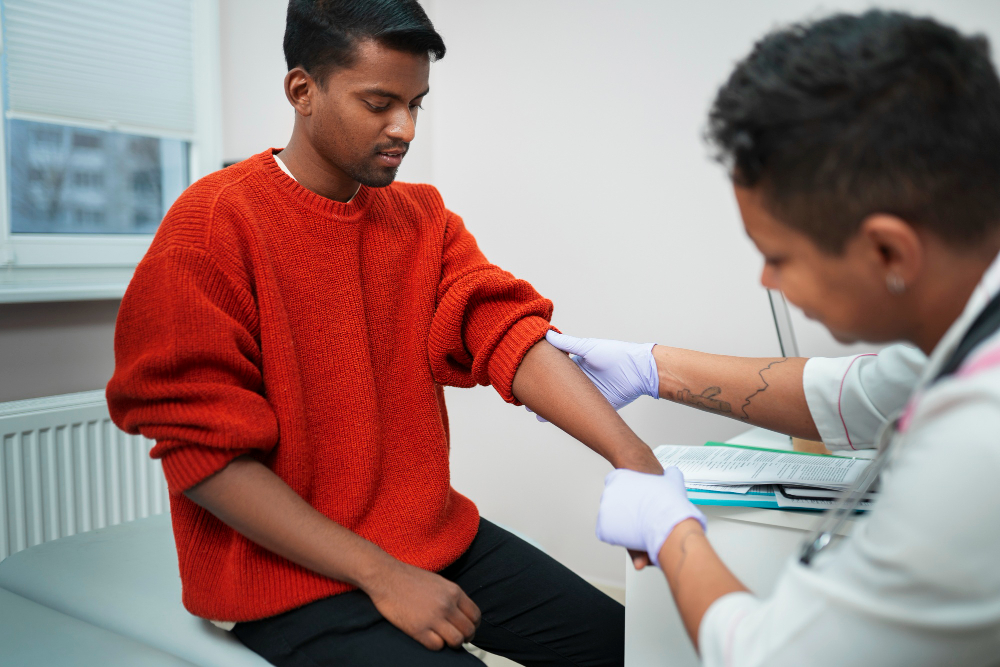Book on Whatsapp
9892101616
Stress Echo Test: Purpose, Normal Range, Preparation, and Result Interpretation
Healthy Lifestyle
Tue Jan 21 2025
The stress echocardiogram is the non- invasive diagnostic test which helps to evaluate the function of the heart and also the structure during the physical stress. It mainly help to combine an echocardiogram with the stress test that mainly involve the exercise on the stationary bike or treadmill. The test will mainly help the health care provider to assess the well heart perform under the physical exertion with underlying the heart condition.
Purpose of a Stress Echo Test
The primary goal of a stress echo test is to see how well the heart can function when physically active, replicating the demand that exercise puts on the heart. The test is often employed to diagnose heart conditions such as: The blockage or narrowing of the coronary arteries, which supply blood to the heart, is referred to as coronary artery disease (CAD). Other heart problems problems include: functioning, Valves such that as have leaking or tightening, also known as stenosis. Failure of the heart in pumping enough hemoglobin to the body is called heart failure. Irregular heartbeats are called arrhythmias. Only by watching how the heart behaves under stress can doctors find anomalies that may not show up when the human body is at rest.
Normal Range
The heart is operating normally under stress, according to the typical findings from a stress echo. When exercising, a beating heart will:
- Maintain or increase blood flow to satisfy the body's needs.
- Exhibit typical heart wall contraction and motion.
- During activity, observe no appreciable changes in blood pressure or cardiac rhythm.
Generally speaking, the heart's capacity to manage stress is assessed by monitoring its function before to, during, and following exercise; its beating rate, arterial blood pressure, and general reaction to stress are important markers. The heart appears to be in good health and is pumping blood effectively if these measures fall within the usual range.
Preparation for the Test
Consumers may need to adhere to the following rules prior to having a stress echo performed:
- Clothes: The people should wear comfort dress and athletic foot wear..
- Fasting: There should be fasting prior to the test from eating and drinking.
- Medication: Proper medication should be taken prescribed by the doctor.
- Physical condition: The patient's capacity for exercise will be assessed, and those with severe medical conditions or limited mobility may be subjected to a pharmacological stress test, which simulates exercise with medicine.
Result Interpretation
The test, the physician will review the data and pictures acquired during the stressful echo. Important points of judgement include of:
- Normal outcome: Under stress, the heart valves contract normally, and there are no indications of ischaemia (a shortage of oxygen).
- Abnormal outcome: A shortage of blood flow may be indicated by artery blockages or other heart disorders if certain parts of the heart do not contract normally under stress. Exercise-induced abnormalities in blood pressure or heart rhythm could also be an indication of underlying issues.
In order to establish any diagnosis, abnormal results may prompt additional diagnostic testing, such as coronary angiography.
Conclusion
A stress echo is a useful diagnostic tool for heart health, particularly for identifying heart valve problems, coronary artery disease, and other cardiovascular disorders. Physicians can spot any issues and direct the best course of treatment by keeping an eye on the heart's reaction to stress.
Related Tests
Related Packages
Related Blogs

Healthy Lifestyle
Full Body Checkup for Seniors is a Step Towards Better Health
Ageing is a natural and inevitable process that brings about numerous changes in the body. Some occur gradually, while others happen unexpectedly, often affecting physical strength, immunity, and overall vitality. For senior citizens, maintaining good health is not simply about treating illnesses when they arise; it is about preventing them and detecting potential health issues early. In this regard, a full body checkup is an invaluable step towards ensuring better health, longer life, and improved quality of living.
Key Components of a Senior Full Body Checkup
A typical senior health checkup is designed to address age-specific concerns. It usually includes:
- Blood and Urine Analysis – To assess organ function, detect infections, and identify deficiencies.
- Cardiac Evaluation – ECG, echocardiograms, or stress tests to monitor heart health.
- Liver and Kidney Function Tests – To ensure these vital organs are performing efficiently.
- Bone Density Test – To detect the risk of osteoporosis.
- Cancer Screening – Prostate tests for men and breast or cervical screening for women.
- Eye and Ear Examination – To identify vision or hearing impairments.
- Imaging Tests – Such as chest X-rays or ultrasounds for deeper health insights.
Benefits Beyond Disease Detection
Full body checkups are not limited to diagnosing illnesses. They create a health baseline, enabling doctors to monitor changes over time. This supports preventive care, allowing lifestyle adjustments before small issues turn into major health problems. It also aids in medication management, ensuring current prescriptions are effective and free from harmful side effects. Additionally, checkups provide nutritional guidance, helping address vitamin or mineral deficiencies, and include mental health screenings to detect early signs of depression, anxiety, or cognitive decline.
How Often Should Seniors Get a Checkup?
Healthcare experts generally recommend that seniors above the age of 60 undergo a full body checkup at least once a year. However, those with chronic conditions like diabetes, hypertension, or heart disease may require more frequent evaluations as advised by their physician.
Making the Most of the Checkup
To maximise the benefits, seniors should:
- Maintain a record of past medical history and current medications.
- Communicate any unusual symptoms to their doctor.
- Follow pre-test instructions, such as fasting, when required.
- Use the results to adopt healthier habits—balanced diet, regular exercise, stress management, and adequate rest.
A full body checkup for seniors is not just a medical procedure—it is a proactive investment in health, longevity, and independence. It offers peace of mind, empowers individuals to take charge of their well-being, and ensures the golden years are active, fulfilling, and healthy. Indeed, prevention is not merely better than cure—it is the foundation for living better, longer, and with greater confidence.
At Manipal TRUtest, we offer senior-friendly full body checkup packages that cover essential tests for overall well-being. With expert guidance, NABL-accredited labs, and doorstep sample collection, we make preventive healthcare convenient and reliable. Staying healthy in your golden years starts with awareness. Book your Full Body Checkup for Seniors with Manipal TRUtest and take a proactive step toward better health today.

Healthy Lifestyle
Why Regular Medical Tests Matter for Today’s Youth
When we think of medical checkups, we often associate them with middle age or older adults. But in today’s fast-paced and often stressful world, young people are increasingly juggling academics, careers, social lives, and digital distractions. Regular medical tests are not optional, but are essential to , promote overall well-being, and laying the foundation for a healthier future.
The Changing Health Landscape for Youth
Contrary to popular belief, young people are not immune to chronic diseases or health complications. Rising rates of obesity, diabetes, hypertension, mental health disorders, and lifestyle-related conditions among the youth are alarming trends. Sedentary lifestyles, unhealthy eating habits, increased screen time, and stress contribute significantly to these risks. Moreover, many conditions remain asymptomatic in their early stages, making it difficult to identify problems without proper medical evaluation.
Regular medical tests help bridge this gap by providing valuable insights into an individual’s health status before symptoms manifest. Whether it is blood pressure measurement, blood sugar testing, cholesterol level checks, or mental health screenings, these assessments allow healthcare providers to identify risk factors and intervene early. For youth, this proactive approach is essential to prevent the progression of diseases and maintain optimal health.
Early Detection Leads to Better Outcomes
One of the most significant benefits of regular medical tests is early detection. When health issues are caught early, they are often easier to manage or even reverse. For example, elevated blood sugar levels can indicate prediabetes, a condition that, if addressed promptly with lifestyle changes, can prevent the development of full-blown diabetes. Similarly, detecting high cholesterol or blood pressure early on enables timely interventions that reduce the risk of heart disease later in life.
Beyond physical health, routine screenings can also highlight mental health concerns such as anxiety or depression, which are increasingly prevalent among young people. Early recognition and support can significantly improve quality of life and academic or professional performance.
Building Healthy Habits for Life
Regular health check-ups foster awareness and responsibility toward one’s well-being. When youth engage in routine medical testing, they gain a clearer understanding of their bodies and how lifestyle choices affect their health. This awareness encourages healthier habits, including balanced nutrition, regular physical activity, adequate sleep, and stress management.
Moreover, medical tests provide an opportunity for young individuals to discuss any concerns with healthcare professionals. This interaction helps dispel myths, reduce fear of medical procedures, and build trust in healthcare systems, encouraging continued engagement with preventive care.
Addressing Genetic and Family Health Risks
Family history plays a crucial role in determining an individual’s risk for certain diseases. Conditions like heart disease, diabetes, certain cancers, and autoimmune disorders often have hereditary components. By undergoing regular medical tests, youth with a family history of such illnesses can monitor key health markers closely and take preventive actions.
Key Tests Recommended for Young Adults
- Basic blood profile – CBC, blood sugar, cholesterol
- Vitamin & mineral tests – Vitamin D, B12, calcium, iron
- Liver & kidney function tests – For overall organ health
- Thyroid profile – To detect imbalances early
- Fitness & lifestyle markers – BMI, ECG (if risk factors present)
Overcoming Barriers and Encouraging Access
Regular medical tests are a cornerstone of preventive health for today’s youth. They empower young individuals to detect potential health issues early, adopt healthier lifestyles, and take control of their well-being. As health challenges evolve with modern lifestyles, integrating routine screenings into youth healthcare practices is essential to build a foundation for long-term health and happiness.
At Manipal TRUtest, we offer youth-friendly health packages designed to detect lifestyle risks early. With accurate reports, quick turnaround, and expert guidance, we help today’s generation take charge of their well-being.
By valuing and investing in regular medical tests today, youth can pave the way for a healthier tomorrow, one marked by vitality, resilience, and a life well-lived.

Healthy Lifestyle
How STD Panel Testing Helps in Early Detection and Treatment
Sexually transmitted diseases (STDs) are a significant public health concern worldwide. They often go unnoticed because many of them do not show immediate symptoms. However, if left untreated, STDs can lead to serious health complications, including infertility, organ damage, and increased risk of HIV transmission. One of the most effective ways to manage and control the spread of these infections is through regular STD panel testing. This comprehensive screening helps in the early detection and timely treatment of STDs, ensuring better health outcomes and reducing the risk of complications.
What Is STD Panel Testing?
An STD panel test is a group of diagnostic tests that check for the presence of multiple sexually transmitted infections in the body. These panels typically screen for common STDs such as chlamydia, gonorrhea, syphilis, HIV, hepatitis B and C, herpes simplex virus (HSV), and human papillomavirus (HPV). The tests may involve blood samples, urine samples, or swabs, depending on the infections being tested.
Importance of Early Detection
One of the main advantages of STD panel testing is early detection. Many STDs are asymptomatic in their initial stages, meaning a person may carry and transmit the infection without even knowing it. Regular testing allows these infections to be identified before symptoms appear, which is crucial for starting treatment early and preventing further transmission to partners.
For example, chlamydia and gonorrhea are bacterial infections that can be cured with antibiotics if detected early. However, if left untreated, they can cause pelvic inflammatory disease (PID) in women and infertility in both men and women. Similarly, HIV, though not curable, can be managed effectively with antiretroviral therapy if diagnosed early, allowing individuals to lead long and healthy lives.
Helps Prevent Complications
STD panel testing not only identifies infections but also prevents long-term health complications. For instance, untreated syphilis can damage the heart, brain, and other organs over time. Hepatitis B and C can lead to chronic liver disease and liver cancer. Early treatment through medication or lifestyle changes can significantly reduce the risk of these severe consequences.
Additionally, early detection plays a vital role in preventing congenital infections. Pregnant women with undiagnosed STDs can transmit infections like syphilis, HIV, or herpes to their unborn child, leading to birth defects, premature birth, or even stillbirth. Regular STD screening during pregnancy helps protect both the mother and the baby.
Encourages Safer Sexual Practices
Regular STD testing promotes awareness and encourages individuals to adopt safer sexual behaviors. Knowing your STD status helps in making informed decisions, communicating openly with partners, and using protection such as condoms. It also helps reduce the stigma associated with STDs by normalizing testing as a part of routine healthcare.
Conclusion
STD panel testing is a critical tool in the early detection and treatment of sexually transmitted diseases. It empowers individuals to take charge of their health, prevent the spread of infections, and avoid serious health complications. Whether you are sexually active, have multiple partners, or are entering a new relationship, regular STD testing should be a part of your healthcare routine. Early detection leads to timely treatment, and timely treatment leads to better health, stronger relationships, and a safer community.
